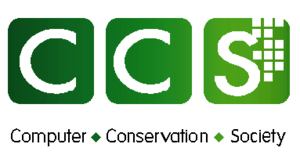Computer Conservation Society
The Computer Conservation Society (CCS) is a British organisation, founded in 1989. It is under the joint umbrella of the British Computer Society,[1] the London Science Museum and the Manchester Museum of Science and Industry.[2][3]
 | |
| Founded | 1989 |
|---|---|
| Type | Professional Organisation |
| Focus | History of Computing in the UK |
| Origins | The British Computer Society, Science Museum, MOSI |
Area served | UK and worldwide |
| Method | Research, Education, Restorations and Recontructions |
Members | 1,000+ |
| Website | www.computerconservationsociety.org |
Overview
The CCS is interested in the history of computing in general and the conservation and preservation of early British historical computers in particular.[4]
The society runs a series of monthly public lectures between September and May each year in both London and Manchester. The events are detailed on the society's website.[5]
The CCS publishes a quarterly journal, Resurrection.[6][7]
The society celebrated its 25th anniversary in 2014.[8][9]
Dr Doron Swade,[10] formerly the curator of the computing collection at the London Science Museum, was a founding committee member. The current chair of the society is Mr David Morriss. The immediate past chair was Mrs Rachel Burnett.
Projects
The society organises a number of projects to reconstruct and maintain early computers and to conserve early software. For example:
- Restorations
- Elliott 401
- Elliott 803
- Elliott 903 and 905
- DEC Systems
- Pegasus
- ICT 1301 Project
- Harwell Dekatron Computer
- Differential Analyser
- HEC 1
- Reconstructions
- Colossus Rebuild
- Manchester Baby
- Bombe Rebuild
- EDSAC Replica Project[11][12]
- Babbage's Analytical Engine
- Other projects
Locations
London Science Museum:
- Ferranti Pegasus (Not currently being displayed working)
Museum of Science and Industry, Manchester:
- Manchester Baby
- Hartree Differential Analyser
The National Museum of Computing:
- Colossus
- Harwell Dekatron or WITCH
- ICL 2966
- Elliot 803
- Elliott 905
- EDSAC Replica
Bletchley Park Trust:
- Bombe
Currently not on public display:
- ICT 1301 (Currently in storage at The National Museum of Computing)
- Elliott 401
References
- "Computer Conservation Society". British Computer Society. Retrieved 8 January 2018.
- "Computer Conservation Society: Aims and Objectives of the Society". Digital 60. UK: University of Manchester. Retrieved 8 January 2018.
- "Computer Conservation Society". FOLDOC. Retrieved 8 January 2018.
- Johnson, Roger. "Computer Conservation Society (CCS) – Its Story and Experience". Making the History of Computing Relevant. IFIP Advances in Information and Communication Technology book series (IFIPAICT). 416. Springer. pp. 249–257. doi:10.1007/978-3-642-41650-7_22. ISBN 978-3-642-41649-1.
- "Events". Computer Conservation Society. Retrieved 8 January 2018.
- The CCS Journal – Resurrection, British Computer Society, retrieved 8 January 2018
- Resurrection – The CCS Journal, Computer Conservation Society, retrieved 8 January 2018
- Halfacree, Gareth (15 October 2014). "Computer Conservation Society turns 25". www.bit-tech.net. bit-tech. Retrieved 8 January 2018.
- "The British Computer Conservation Society is 25 years old". ajovomultja.hu. 27 October 2014. Retrieved 8 January 2018.
- Swade, Doron (20 January 2017). "Winter 2016 report to the Computer Conservation Society". blog.plan28.org. Plan 28 Blog. Retrieved 8 January 2018.
- "The EDSAC Replica Project – Computer Conservation in the UK". Computer History Museum. Retrieved 8 January 2018.
- "Electronic Delay Storage Automatic Computer EDSAC Replica Project" (PDF). chiphack.org. Retrieved 8 January 2018.
- "Our Computer Heritage". Computer Conservation Society.
- "CCS launches the Tony Sale Award". The National Museum of Computing. 8 May 2012. Archived from the original on 9 January 2018. Retrieved 8 January 2018.
- "Tony Sale Award". Computer Conservation Society.
External links
- CCS website
- Our Computer Heritage – a project led by the CCS